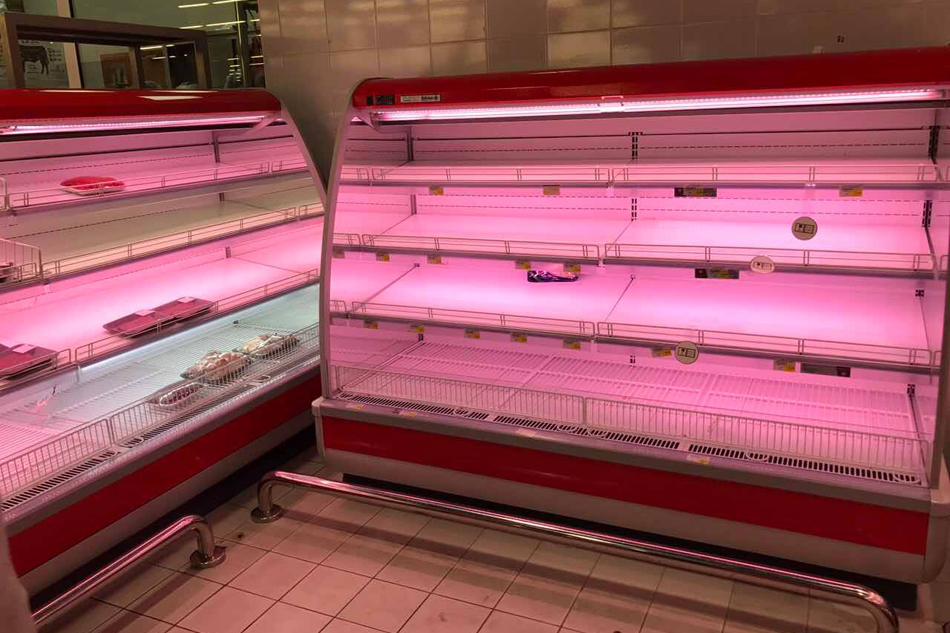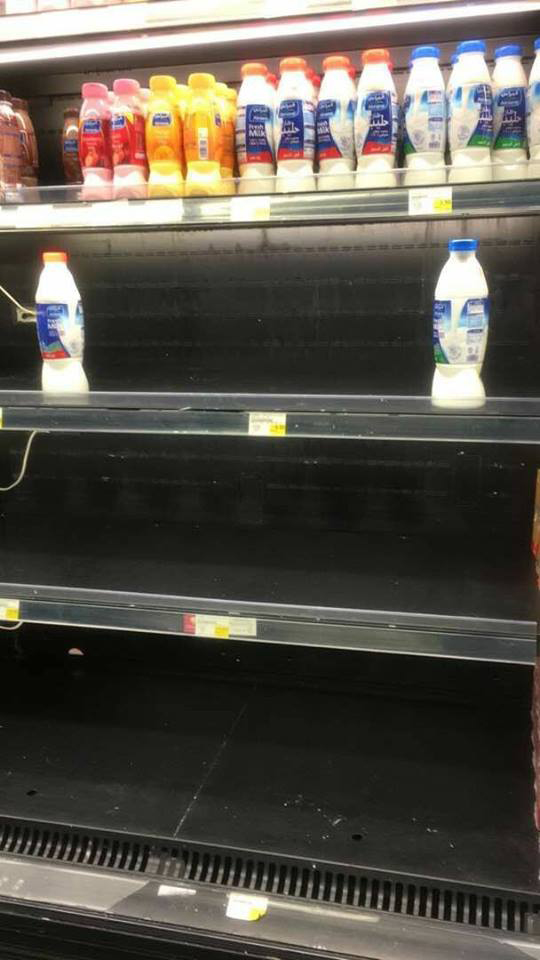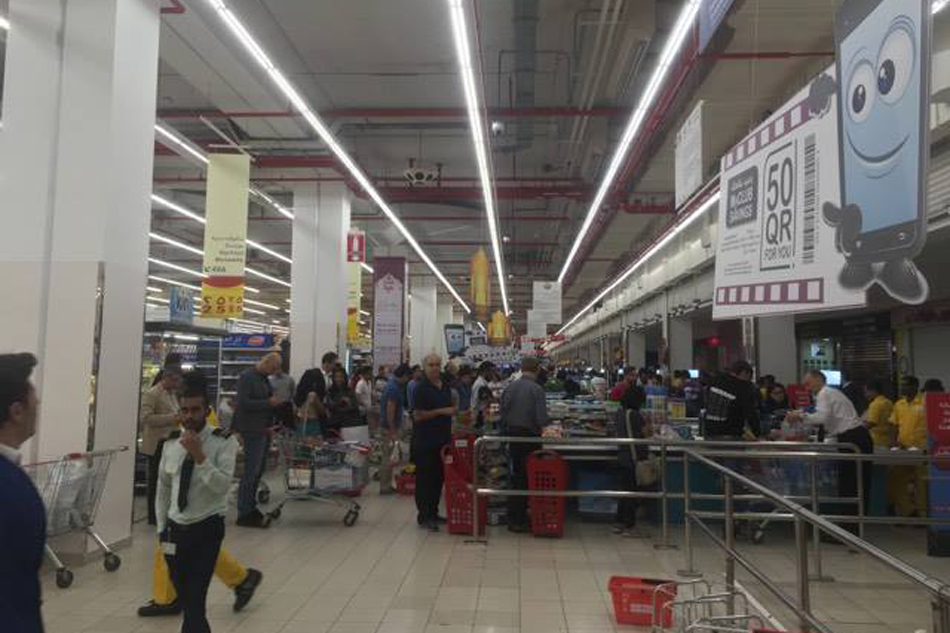LOOK: Almost empty grocery shelves in Doha as residents stock food | ABS-CBN
ADVERTISEMENT

Welcome, Kapamilya! We use cookies to improve your browsing experience. Continuing to use this site means you agree to our use of cookies. Tell me more!
LOOK: Almost empty grocery shelves in Doha as residents stock food
LOOK: Almost empty grocery shelves in Doha as residents stock food
ABS-CBN News
Published Jun 06, 2017 01:47 AM PHT
DOHA - Shelves of some grocery stores in Doha were almost empty on Monday as Qatar's residents stocked food after 7 countries cut ties with the kingdom.
DOHA - Shelves of some grocery stores in Doha were almost empty on Monday as Qatar's residents stocked food after 7 countries cut ties with the kingdom.
Photos sent to ABS-CBN News by an overseas Filipino worker in Doha showed almost empty shelves at one grocery, as well as queues of shoppers with carts filled with food.
Photos sent to ABS-CBN News by an overseas Filipino worker in Doha showed almost empty shelves at one grocery, as well as queues of shoppers with carts filled with food.
Eva Tobaji, an expat resident in Doha, told Reuters after returning from shopping: "People have stormed into the supermarket hoarding food, especially imported ones ... It's chaos - I've never seen anything like this before."
Eva Tobaji, an expat resident in Doha, told Reuters after returning from shopping: "People have stormed into the supermarket hoarding food, especially imported ones ... It's chaos - I've never seen anything like this before."
Saudi Arabia, Egypt, United Arab Emirates and Bahrain cut relations with Qatar on Monday over alleged support for Islamists and Iran in a coordinated move. Yemen, Libya's eastern-based government and the Maldives joined in later - opening up one of the worst rifts in years.
Saudi Arabia, Egypt, United Arab Emirates and Bahrain cut relations with Qatar on Monday over alleged support for Islamists and Iran in a coordinated move. Yemen, Libya's eastern-based government and the Maldives joined in later - opening up one of the worst rifts in years.
ADVERTISEMENT
A decision by the Arab world's strongest powers to break off diplomatic ties with Qatar is already hitting food imports into the small Gulf state, Reuters reported on Monday.
A decision by the Arab world's strongest powers to break off diplomatic ties with Qatar is already hitting food imports into the small Gulf state, Reuters reported on Monday.
Qatar, which has a population of 2.5 million people, is largely dependent on imported food to meet its needs.
Qatar, which has a population of 2.5 million people, is largely dependent on imported food to meet its needs.
About 80 percent of Qatar's food requirements are sourced via bigger Gulf Arab neighbors, such as the UAE and Saudi Arabia.
About 80 percent of Qatar's food requirements are sourced via bigger Gulf Arab neighbors, such as the UAE and Saudi Arabia.
Qatar's cabinet said earlier it was still open for trade.
Qatar's cabinet said earlier it was still open for trade.
"The Council would like to reassure Qatar’s citizens and residents that the government had already taken the necessary measures and precautions to ensure that normal life continues, and that there will be no negative impact caused by the latest measures," the Qatari government said in a statement.
"The Council would like to reassure Qatar’s citizens and residents that the government had already taken the necessary measures and precautions to ensure that normal life continues, and that there will be no negative impact caused by the latest measures," the Qatari government said in a statement.
"In addition, sea ports will continue to be open for trade, and air space will continue to be open for trade, transport and air travel, with the exception of the countries that have closed their borders and air space."
"In addition, sea ports will continue to be open for trade, and air space will continue to be open for trade, transport and air travel, with the exception of the countries that have closed their borders and air space."
TRUCKS STUCK AT BORDER
TRUCKS STUCK AT BORDER
There were already signs of emerging difficulties. Reuters sources said thousands of trucks, carrying food supplies, are stuck at the border with Saudi Arabia and are unable to cross over into Qatar.
There were already signs of emerging difficulties. Reuters sources said thousands of trucks, carrying food supplies, are stuck at the border with Saudi Arabia and are unable to cross over into Qatar.
Saudi Arabia's Ports Authority notified shipping agents on Monday not to receive vessels carrying Qatari flags or ships that are owned by Qatari companies or individuals.
Saudi Arabia's Ports Authority notified shipping agents on Monday not to receive vessels carrying Qatari flags or ships that are owned by Qatari companies or individuals.
The move followed a similar step by the UAE port of Fujairah, which issued a notice barring all vessels carrying Qatari flags and any destined for or arriving from Qatari ports.
The move followed a similar step by the UAE port of Fujairah, which issued a notice barring all vessels carrying Qatari flags and any destined for or arriving from Qatari ports.
The world's no. 1 container shipping line Maersk said on Monday it was still open for business to and from Qatar, adding that it was following developments closely.
The world's no. 1 container shipping line Maersk said on Monday it was still open for business to and from Qatar, adding that it was following developments closely.
Qatar has denounced its diplomatic isolation as based on lies about it supporting militants. It has often been accused of being a funding source for Islamists, as has Saudi Arabia.
Qatar has denounced its diplomatic isolation as based on lies about it supporting militants. It has often been accused of being a funding source for Islamists, as has Saudi Arabia.
Iran, long at odds with Saudi Arabia and a behind-the-scenes target of the move, blamed U.S. President Donald Trump's visit last month to Riyadh.
Iran, long at odds with Saudi Arabia and a behind-the-scenes target of the move, blamed U.S. President Donald Trump's visit last month to Riyadh.
Trade sources said it was possible that Qatar could look at other sources of food from Asia and also Iran if the diplomatic crisis was not resolved.
Trade sources said it was possible that Qatar could look at other sources of food from Asia and also Iran if the diplomatic crisis was not resolved.
Reza Nourani, chairman of Iran's Union of Exporters of Agricultural Products, was quoted by the semi-official Fars news agency as saying that Tehran could export food to Qatar by sea, which could reach the country in 12 hours.
Reza Nourani, chairman of Iran's Union of Exporters of Agricultural Products, was quoted by the semi-official Fars news agency as saying that Tehran could export food to Qatar by sea, which could reach the country in 12 hours.
"We can export any kind of agricultural products and food from Iranian ports of Bandar Abbas, Bandar Lengeh and Bushehr,” Nourani told Fars, which is believed to be affiliated to Iran's hardline Revolutionary Guards. - with a report from Reuters
"We can export any kind of agricultural products and food from Iranian ports of Bandar Abbas, Bandar Lengeh and Bushehr,” Nourani told Fars, which is believed to be affiliated to Iran's hardline Revolutionary Guards. - with a report from Reuters
ADVERTISEMENT
ADVERTISEMENT





